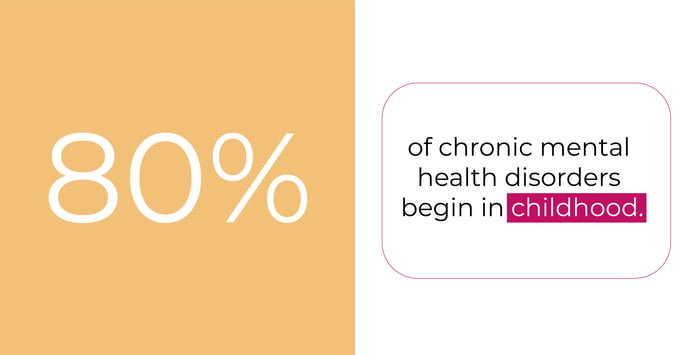
As adults, it’s hard to imagine the level of pressure our kids face in today’s world. Each day many deal with stress associated with increased pressure in school, social media, and bullying. While we’d like to think that our children’s lives are always happy and carefree, the reality can be much different.
According to the Child Mind Institute, one in five children suffer from a mental health or learning disorder, and 80% of chronic mental health disorders begin in childhood.

World Mental Health Day is a great time for us as parents to recognize what we can do to best support our kids’ mental well-being and help them if they’re struggling:
1. Keep the Communication Line Open
Many childhood mental health disorders go undiagnosed for too long because kids are ashamed to talk about how they feel, or simply don't know how to put it into words. Make sure your home is a place where your child feels comfortable sharing how they feel and what's going on in their life. When your child experiences something that makes them feel sad or angry, talk to them about where these emotions are coming from and encourage healthy methods of coping.
2. Get Outside
Spending time outside can do SO much good for kids. Besides all the physical benefits that come with outdoor playtime, it also has a huge positive impact on their mental health. According to a study done by researchers in 2014, children who play outside “find peace away from stresses in the classroom and daily life.” Help your kids find a healthy outlet for stress by encouraging them to take a break from screens and spend some time outside.
3. Stay Aware
Have you ever heard a parent say they wish they noticed the signs? If something seems off, be the parent that notices the signs and takes the appropriate steps to help your child. While some change in kids' lives is normal, changes in grades, friendships, and behavior can also be signs of a deeper problem. You’re the best person to notice if something seems wrong with your child, so trust your gut instinct.
4. Listen to the Experts
Teachers are often the people besides you who spend the most time with your child. Use parent-teacher conferences as a chance to ask about more than just grades. Check in and see how they’re adjusting socially, what their attitude is towards others, and if there’s anything out of the ordinary. If a teacher ever contacts you directly with concerns about your child’s grades or behaviors, trust their judgment and ask what they recommend.
5. Take Care of Yourself
You know the old adage about putting on your own oxygen mask before you help with someone else's? This “you have to take care of yourself if you want to take care of others” mentality also goes for mental health. If you’re managing your own mental health in a positive way, you’ll be much more able to help your child do the same. That doesn’t mean that your child can never see you stressed or upset; just try to handle your emotions the way you would want them to handle theirs.



